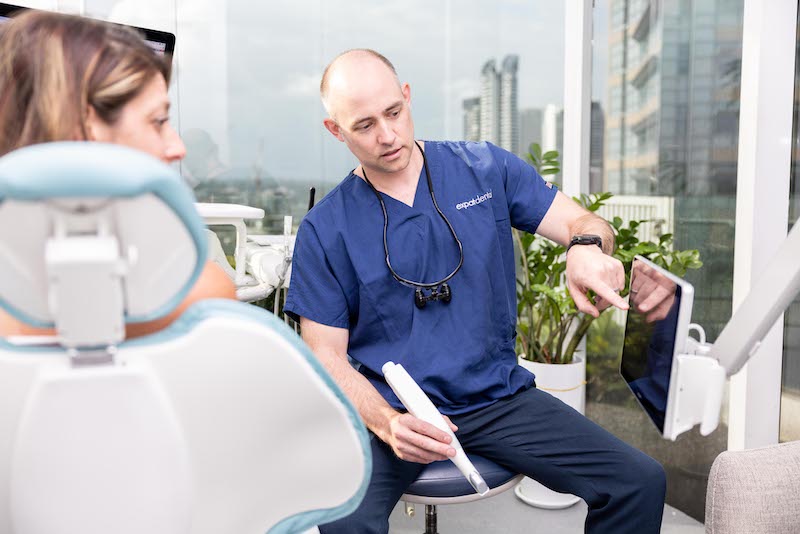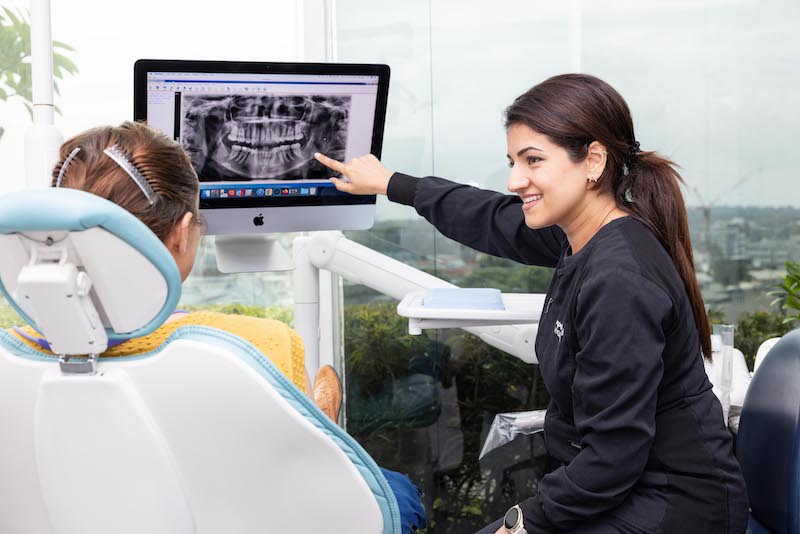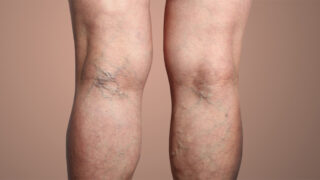Do you feel a sharp pain in your teeth whenever you sip an iced drink or bite into something sour? Tooth sensitivity is quite common – figures estimate it affects around half of the population. But what causes sensitive teeth (hint: it might have something to do with your tooth enamel)? And how to reduce tooth sensitivity? We spoke with DR JOSH LIU and DR MATT THOMPSON of Expat Dental to find out more.

What causes sensitive teeth
Tooth sensitivity usually doesn’t just happen overnight, according to Dr Josh. “Rather, it’s caused by various factors and gradually develops over time. It’s important to address this to prevent further discomfort and maintain oral health.”
Dr Josh explains that one of the most common causes of sensitive teeth is enamel erosion and abrasion. “Over time, brushing too hard or using a hard-bristled toothbrush can wear down tooth enamel, exposing dentin and increasing sensitivity. Tooth enamel is not a living tissue, so it cannot repair itself if it is damaged or eroded. This is why it’s so important to take care of our teeth and avoid anything that could damage or erode the enamel.”
Other causes of sensitive teeth include gum recession, which can happen if you have gum disease or brush too aggressively; consuming too much acidic foods and drinks that can gradually erode the tooth enamel; and undergoing certain dental treatments such as teeth whitening or dental fillings that can cause temporary or prolonged tooth sensitivity.

And are you a teeth grinder? Turns out, bruxism (grinding and clenching of the jaw) is one of the main contributors to sensitive teeth. Constant clenching and grinding of the teeth, especially while we sleep, can wear away the tooth enamel and cause cracks, leading to increased sensitivity, notes Dr Josh. “Although our enamel is not alive, our tooth (the pulp) is, and prolonged clenching and grinding of teeth can lead to inflammation inside the nerves which makes your teeth hypersensitive, or worse, they may eventually die.”
How to know if you have sensitive teeth
If you often feel pain in your teeth while enjoying a hot or ice-cold drink, or sweet or sour foods, that’s a clear indicator of tooth sensitivity. Dr Josh explains that patients experience “shooting pains deep into the tooth nerve endings, often described as sudden and sharp.”
Furthermore, you might feel pain in your teeth just from breathing in cold air, or while biting or chewing. Swelling or redness of the gums can also indicate overall tooth sensitivity.
Sensitive teeth, gum disease or cavities?
It can sometimes be tricky to tell tooth sensitivity apart from other common dental problems, such as cavities or gum disease. Dr Josh explains that they do have distinct characteristics that can differentiate them. “It is crucial to consult a dental professional for an accurate diagnosis and appropriate treatment for any of the conditions.”

While tooth sensitivity involves localised discomfort usually with “a brief, sharp pain originating from the exposed dentin after exposure to hot, cold or acidic stimuli”, cavities cause prolonged toothache, often accompanied by visible pits or holes to the damaged tooth. Gum disease, on the other hand, involves swollen, tender or bleeding gums. It’s often accompanied by bad breath and a persistent bad taste in the mouth.
However, Dr Josh notes that “cavities and gum disease initially do not cause pain. Only when they have become chronic and ignored for long periods of time do they become bigger issues and then become symptomatic, so it is best to try and seek regular dental care to avoid these larger oral health issues”.
How to reduce tooth sensitivity
Good news! If you’re wondering how to manage and reduce tooth sensitivity, there are indeed plenty of ways to do so. One of the easiest solutions is using desensitising toothpaste, notes Dr Matt Thompson. “Several brands of desensitising toothpaste are available to help combat sensitive teeth. However, it may be necessary to try different brands to find the most effective one for you.”
Dr Matt adds that while you may notice a difference after a few days of using a desensitising toothpaste, most people start to see significant improvement after at least a week or two. “But remember, while desensitising toothpastes and other home remedies can help with pain and sensitivity, it can’t actually correct the dental issues that might be causing the sensitivity in the first place, such as gum disease, damaged teeth or cavities.”
Other treatment options include the application of fluoride, dental sealants or composite bonding by your dentist to strengthen tooth enamel and protect sensitive areas. In some cases, dentists may also suggest using prescription fluoride at home.
Can lifestyle factors cause tooth sensitivity?
The short answer is yes. “Stress and diet can indeed influence tooth sensitivity by exacerbating various dental issues. Chronic stress, for example, is linked to an array of dental problems, including tooth sensitivity, tooth decay, gum disease, teeth grinding, and jaw joint disorders,” says Dr Matt. “Stress, poor sleep habits, and certain medications can cause us to clench and grind our teeth, which can damage the enamel and lead to sensitivity.”
“Moreover, certain dietary choices can contribute to tooth sensitivity by promoting tooth enamel erosion through acidic foods and drinks, leading to increased susceptibility to sensitivity. Thus, managing stress levels and maintaining a balanced diet are crucial strategies to help in the fight against tooth sensitivity.”

Prevention is the best cure
Dr Matt reassures us that sensitive teeth can often be prevented by adopting good oral care habits and making a few lifestyle changes. These include regular dental check-ups, which are key to identifying and addressing potential causes of tooth sensitivity early. Moreover, dentists at Expat Dental can offer professional treatments like fluoride applications, dental sealants or composite fillings to help prevent and manage tooth sensitivity.
“By maintaining good oral hygiene, minimising exposure to acidic substances, and seeking professional dental care, individuals can take proactive steps to prevent the development or worsening of tooth sensitivity,” adds Dr Matt.
Expat Dental – Novena Medical Center Clinic
#08-15/16 Novena Medical Center, 10 Sinaran Drive | 6397 6318
Book online | WhatsApp | info@expatdental.com
Liked these insights about how to reduce tooth sensitivity from dentists at Expat Dental? Check out more health tips in our monthly Health Hub.
To make the most of living in Singapore, read our latest City Guide here for free!
Don't miss out on the latest events, news and
competitions by signing up to our newsletter!
By signing up, you'll receive our weekly newsletter and offers which you can update or unsubscribe to anytime.



